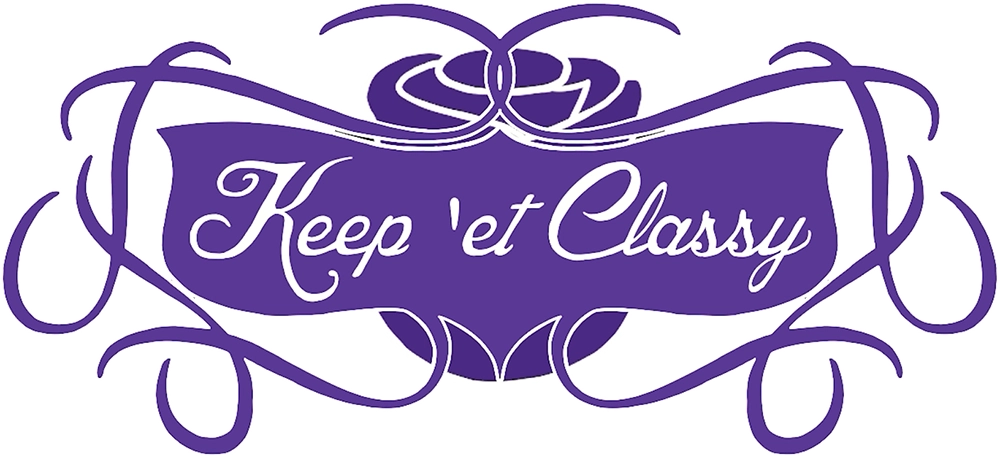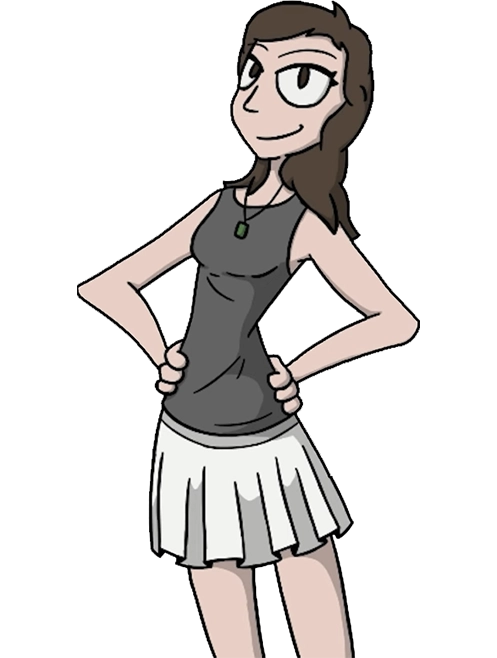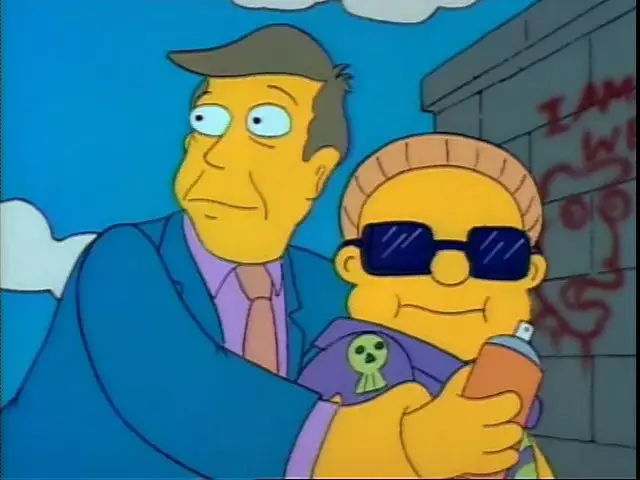My Recollection
Bart worries about being kept behind after failing an exam. Martin Prince’s brief time as a cool kid. Bart’s reaction to kissing Krabappel reminds of the time I called the teacher, “Mum”. I’m essentially a combination of young Martin Prince and that future episode where Milhouse gets into working out.
In year 3, we had to do a presentation on a topic. It was basically the oral book report Bart had to do but without the harrowing ordeal of having to read anything. Essentially a graded show-and-tell. One of the more Gollum-like ferals, a kid named Allen, had not brought a thing to show so he was letting it all ride on the tell. He stood in front of Mr Ozanne’s year 3 class and recited:
Ching-Chong Chinaman went to milk a cow
Ching-Chong Chinaman didn’t know how
Ching-Chong Chinaman pulled the wrong tit
Ching-Chong Chinaman got covered in shit.
I can’t say for certain why he was allowed to finish. Casual racism is always a possibility, though I’d heard other teachers be explicitly racist and Mr Ozanne never appeared to join in. The idea I’ve since settled on is that the performance demonstrated enough of the requisite skills needed to get over an incredibly low bar.
Credit where it’s due, it’s incredibly creative for a level of racism that would generally label anything remotely poetic as faggy.
The Episode
The Simpsons’ intro, in its familiar form here that would last until its 20th season, has a level of innate animal familiarity to me typically reserved for the faces of loved ones, food, and mating opportunities. It’s an important change both because it heralds the arrival of stable character design and animation style, and because of the new sequences.

These additions to the intro herald a major choice of direction for the series. I say choice and not change as season one’s requisite domestic focus rendered the anonymity of Springfield an inevitability over a selected option. Much like how the Long Island location of Everybody Loves Raymond was little more than a means of providing faint cultural flavour to the show’s domestic setting, Springfield was merely the Any in “Anytown, USA”. This new intro is the first step in defining Springfield as a setting-character, a kind of deeper kit of expectations from which the writers can create a more complex arrangement of characters and situations. This sets it up to function more like the New York of Seinfeld: a city so well defined that it can function as a vast, anonymous backdrop full of extras or a character itself that can believably be the site of such unusual comedic situations.
The real and aging actors in Everybody Loves Raymond create a naturally evolving palette for family story ideas. Springfield’s ageless citizens and cartoon reality handicap put a hard limit on the quantity of viable domestic stories. This was the first step in broadening The Simpsons narrative palette and it was a confident one that shows in an episode that uses its new character to support an excellent standalone story without now seemingly inevitable B plot. Bart fails his book report and is on track to fail his history test. If he fails, he repeats the 4th grade, and the rest of the episode sees Bart struggle with the slacker’s most feared question: am I wilfully lazy or actually stupid. It’s a simple conflict made powerful by the absence of a B story, more on that later, and it makes this episode one of the great pieces on Bart as a human 10 year old and not the shifting mass of archetypes and parodies he became.
The more Bart became a chimera of rebellious youth archetypes the less episodes like this were possible. The fearful see unwavering confidence in the sources of their anxiety and this prevents the moments of vulnerability that would add depth or reality to a character. It’s a kind of cosmic joke that the only people who think teenagers are invincible are teenagers and the people who fear them. Later Bart was the true embodiment of this in the “underachiever and proud of it” joke. There is no depth to be found in that one line, but this episode peeks beneath the veneer of confidence to find the terrified child beneath the cliche.
A legitimately frightened child can be terribly funny, but seldom (if ever) within the kind of reality The Simpsons inhabits. The Simpsons world is one of buffoons, nincompoops, and other punishable cartoon dullards who either deserve what they get or can spring back into shape regardless of what gets dropped on them. Later Bart is this, and he can suffer more for it as we never really consider it as suffering. A terrified child is an edge beyond the Simpsons tonal palette so it doesn’t work as a joke. This episode’s frightened child casts a stark light on his surroundings, focusing this time on the realities of his school life, and they are ugly in full view.
Much like Bart the Genius, Bart actually tries in this episode. He attempts to study and even hires a tutor in the form of Martin Prince who is doing it in return for his own tutoring in the ways of cool. This is an odd bargain, given that whoever gets first lead will be losing the very skills they are contracted to transfer to the other. This winds up happening, too, as Martin absorbs enough of Bart’s otherwise perpetual cynical detachment to renege on his deal.
Aside from this, Bart’s desire to study is honest, as his statements are performed for the audience, and his distractions are perfectly understandable. Videogames, cartoons, and even quality time bonding with his father are all natural — and even admirable in the case of time with his dad — distractions. This is the background of the Rebel that the fearful don’t see or don’t want to see. Bart here is not an underachiever and proud of it. He is trying, failing, and very much afraid of it. All of which would be preventable were he not surrounded by negligent school system.
Krabappel is a broken teacher, the kind you’d expect in a public school like Springfield Elementary, and the embodiment of an older approach to teaching. Bart gets to her on a personal level, and this has led to a combative relationship between the two. One that, because Bart has the demonstrated ability to win engagements, places both on roughly equal ground. This is a critical failure. Children are not equal to adults and one should never engage with a child like it is. You have no authority if you lower yourself to their level, and the snide personal elements of Krabappel’s discipline of Bart pollutes every interaction with a fight Bart’s child animal brain will need to win. I’m reminded of that dumb aphorism about challenging a pigeon to chess, and how you can be really good at chess but it won’t matter because the pigeon will just shit on the board. This gets trotted out when people fail at dealing with some kind of flat-earth imbecile but it’s always made me wonder, what kind of fucking moron challenges a pigeon to chess? If you are the wiser party, it is up to you to structure the challenges in a way that understand the totality of the interaction. All of Krabappel’s punishments are vindictive reactions that create the problems she wants to stop. A pigeon can’t play chess, fucktard, you should know that. Maybe start a little simpler.
Krabappel is personally annoyed by Bart and this personal distaste means she can never see anything but the series of negatives such an emotional reaction reduces him to. This blinds her to a few factors this episode makes obvious to us, but should still be visible to her. There’s a thing about testing when the thing you are testing is a ball of unquantifiable variables and that is knowing what factor your test is actually testing. Does a high pressure exam worth 75% of an overall grade test knowledge of the subject or how well a student copes with stress? Krabappel misses a few things early because she focuses on the criteria and not what the criteria are really testing for. Bart’s ad-hoc book report is actually an indicator that he absolutely can do the work. Aside from skipping reading the book the rest of it borderd on a C- as it skirted the exact things a mid-to-late primary oral report like this look for. So that narrows the field of addressable problems down to two: is the student not literate enough to comprehend the material or do they have poor time management/study skills? Both of these are easily addressable and both the audience and Krabappel can eliminate illiteracy as we’ve seen him read and even a teacher phoning it in can spot an illiterate.
But all Krabappel does is demonstrate her own confusion, which will reinforce Bart’s sense that his own learning is some arcane process he can’t influence, and threaten him. Threats are the worst thing to teach with as you’re essentially hoping fear will trick a person into teaching themselves. Bart doesn’t understand why he’s failing, because introspection like that is hard even when you’re not ten and Bart is fucking ten, a teacher should have a far better idea of what is going on and absolutely should have better plans to deal with whatever the problem is. But this is nothing compared to the visit with school psychiatrist and basically child abuser, Dr J. Loren Pryor.
Pryor’s questioning of Bart is insane, both in tone and content. Staring at a child like it’s a goat fetus at a fair, describing how all the other children are normal and then demanding the child explain why it’s not is not so much a fuck-up of education as it is a masterful piece of child destruction that dabbles in teaching. The things the adults charged with teaching and caring for Bart do in this episode are perfect examples of what not to ever do and represent the other, unexplored part of the Rebel: society’s responsibility. Bart cares, Bart tries, Bart even hires a personal fucking tutor. But the Rebel is an underachiever and proud of it.
Bart winds up passing the test the same way he escaped his nightmare in France, learning made mystical through a sudden, fortuitous emergence. He likens his experience to George Washington’s via an obscure historical fact and this is enough for Krabappel to pass him. It should also be enough for Krabappel to fathom maybe starting this pigeon off on some checkers first but given that the escape from 4th grade never winds up happening, it’s sort of a moot point.
This story works so well because everything else takes a back seat to the primary narrative. There’s a real visible reluctance in a lot of sitcoms and one hour fiction to take a week off any primary character. This fear will manifest as the B story or, in the case of shows like Arrow and Flash, jamming every character into the plot so nobody gets a square minute of relevance. The lighter comedic tone of The Simpsons lends itself to Bs and there’s a great many good ones to choose from, but this episode proves their absence can result in tighter focus and far more meaningful character moments for even the lesser used. Homer’s identification with giant monsters (we share a habit of crying at the end), and Lisa’s deism foreshadowing Buddhism are brief moments given weight by their natural presentation through the Bart lens. All too frequently a B story is a stick of garlic bread passed off as a meal. This is a wonderful main course with accompanying sides that enhance each other.
Yours in thinking I’m happy about it, Gabriel.
Jokes, lines, and stray thoughts
First of all, the idea of “dumb” and “smart”. Neither of these really exist as the laity understand them. Short of a diagnosed medical condition or injury, we’re all pretty much the same. People get better at things by working at them, that is all, anything you suck at is something you can be good at if you take the time to learn. We absolutely have predilections, and this is where some of the myths around lines like, “I’m not a maths person” come from, but these do not gift you with understanding they just mask the labour. If you enjoy it, you don’t think of it as practise in the way someone who doesn’t like it will. You’ll spend your spare time thinking about a subject and engaging in it and then people will mistake hours of practise for some inbuilt skill. We are not any one thing. We are all the same. Smart and dumb are just reflections of work filtered through the eyes of species that thinks in terms of inherent traits.
“Escape from Grandmas House” should be a Doom mod.
Homer’s line of, “I just wanna have a beer while I’m caring” is a top-quality drunk statement.
Sherri and Terri are dicks to Bart, and I feel the narrative is being a bit cruel to him too, as Bart questioning them takes place before the test. It’s not remotely cheating, it’s literally a last minute study attempt but the tone of the moment veers it toward being a punishment for some kind of fault in Bart. That or it’s still some lingering Simpsonian injustice leftover from season 1. Probably the latter.
The nurse in this episode is Ms Phipps and always looked like she was going to get more focus than she did. One of the few side characters with a memorable design or trait that didn’t go anywhere. She’s popped up again in a few episodes but that’s about it.
Amoria Phlebitis, the disease Bart’s faking got diagnosed as, is itself a fake disease. Phlebitis is an inflammation of the veins and amoria is a branch of the cone shell family. It’s such an odd choice as it doesn’t work for any kind of joke. Had Bart’s faking tricked the nurse into diagnosing him with something serious, there’s a joke there. But this is such weirdly highlighted meaninglessness that I can’t help but figure they were just the first two sciency sounding words someone came up with.
Homer still watching giant apes is a nice piece of continuity
“Bring the TV upstairs” is a dead phrase
There are some glances here at a definable Milhouse before the show turned him into a toilet. There’s confidence in his voice that won’t be around for much longer.
“Now I DRIVE the school bus” is a fucking great line, well delivered. An early oral meme that developed broad application around the family and schoolyard.
The word Poindexter pops up here as a slur against nerds and I had to look this up. It has it’s association with the geeky as a result of the character of Poindexter, who was a science genius, in Felix the Cat. It had no such meaning before that, it’s actually an English derivative of a French surname that settled in Jersey, Poingdestre, which literally means “right fist”. This does, of course, suggest the existence of a dark family of Poingsinisters.
There’s a moment when Bart is offering Martin cool lessons where Martin doesn’t believe he needs them. This is a clumsy plot error as he’s a mocked dork in most of his prior appearances and even in this episode.
There’s a good double turn joke when Martin is teaching Bart to study. Bart is sleepily highlighting a book as Martin paces around him, whacking him with a riding crop when Bart commits some form of unseen error. The joke adds a solid second twist by having Martin tell Bart that he’s ready to try it with a real book. Feinting a kind of predictable or visible joke into a hidden second works a bit like how the Keyser Söze twist works in Usual Suspects.
A lot of the misery of humanity can be understood via Martin’s excited exclamation, “The fact that it wasn’t me!” in regards to his excitement over pushing someone into the girls toilet.
This episode features one of the first major cutaway style gags as Bart watches the whole town enjoy the miracle snowfall. The shot itself has a few side characters and priors, including the Bobs Sideshow and RV, and the first example of Krusty with his no longer makeup clown face. The bit contributes to the establishment of Springfield the setting and also Springfield the reality. The scene deftly slips between the realistic and the fantastic whilst simultaneously suggesting it’s both actually happening and just the perception of what’s happening from the one kid locked away from enjoying it. Like the rest of the episode, this aside is very self-assured and represents an important first step toward the humour that will come to define the series.





1 replies to Bart Gets an F
Bungus Bronbo on 7th December 201707 Dec 17 said:
I'm doing a kind of watch-along, where I watch the episode after I read your thoughts on it. It makes it so I can go "Oh that's what that was about," but I'm not sure if I'm doing it backwards. I haven't seen most of the earliest episodes so I should probably watch the show then read this.
I don't know why I typed this comment.
Comment on Bart Gets an F
To reply, please Log in